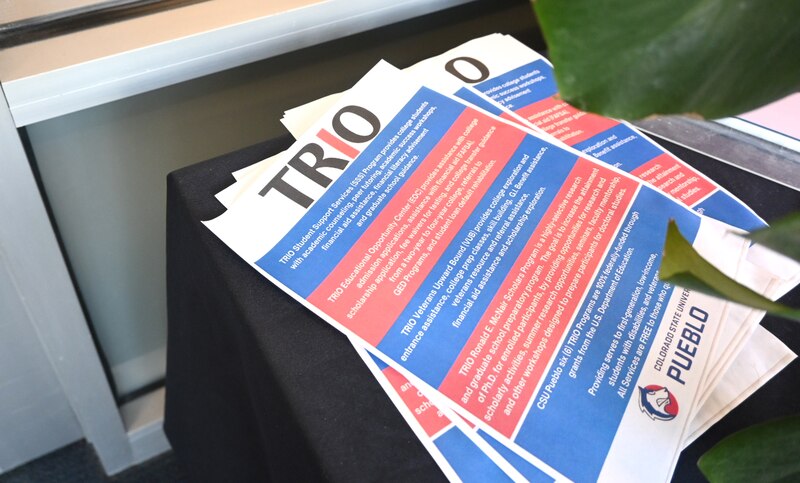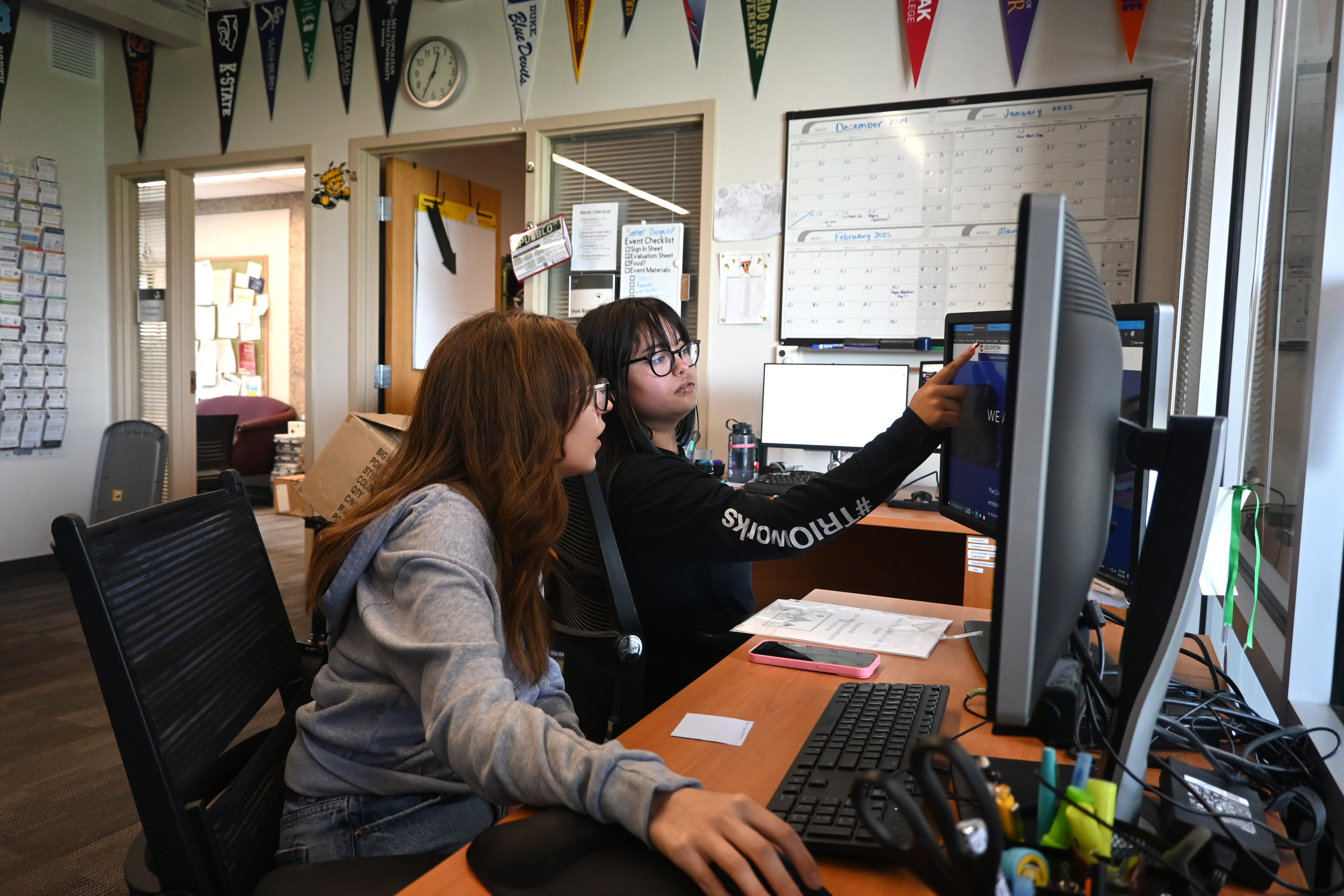Beyond High School is our free monthly newsletter covering higher education policy and practices in Colorado. Sign up to get it delivered to your inbox early.
At one time, Bailee Hernandez didn’t even know how to enroll in college. No one in her family had attended.
She did know that college was expensive.
All that meant she used to think she would go straight from high school into the workforce. But thanks to the staff at Colorado State University Pueblo’s TRIO office, Hernandez enrolled at Colorado Mesa University during the pandemic. Then she dropped out.
CSU Pueblo TRIO staff once again stepped up to help. Hernandez took a year off from college to work before the staff helped her to return to college. This time, she enrolled at CSU Pueblo in her hometown, where she now wants to earn a degree in social work.
The federal TRIO initiative is a set of programs that helps people like Hernandez who face the highest odds of never getting to or finishing college. Across the nation, 870,000 high school and college students and older adults from low-income backgrounds, students with disabilities, and first-generation students are a part of the program. About 17,500 students benefit from the program in Colorado.
But President Donald Trump apparently takes a very dim view of TRIO’s value.
The Trump administration’s proposed budget for fiscal year 2026 would strip all funding from the six-decade old program, leaving college students who have the hardest time getting to college in every part of the country without what advocates, program administrators, and some lawmakers call a vital service.
“For communities like Pueblo, a lot of students don’t know about college because their parents have never gone. They don’t even toy with the idea of going to college because they feel it’s not possible,” Hernandez said. “Programs like these open doors. Taking that away will really increase barriers for those that are already struggling.”
In its budget proposal, the Trump administration has taken the position that the program doesn’t include enough accountability. Trump’s budget says that “TRIO has not met its performance measures for a number of years” and will leave how to support students up to state, college, and local officials.
The federal government provided $1.2 billion for the program in its most recent budget. Almost every Colorado college and university offers the program. TRIO funding is awarded through competitive, multi-year grants.
Congress often disregards many specific proposals in presidential budget blueprints, and TRIO has long enjoyed bipartisan support. But Colorado isn’t the only state where people involved in TRIO have defended it in light of Trump’s budget.
CSU Pueblo Executive Director of TRIO Programs Brenda Trujillo-Aranda said such a move would hurt not just Hernandez and Pueblo, but the entire southeastern Colorado community.
“This isn’t just a budget decision,” she said. “It’s a decision about whose future matters.”
Communities would struggle to support students without TRIO
The TRIO program received its name from its original three programs, but has grown into eight distinct programs — seven of which provide services directly to students. They include the Student Support Services, Educational Opportunity Centers, Ronald E. McNair Postbaccalaureate Achievement, Talent Search, and Upward Bound programs.
That suite of programs includes college awareness programs for middle and high school students, college advising support, and connections to get back to or into college for older adults. TRIO staff teach students not just about traditional two- and four-year degrees, but options like industry credentials and certificates.
A national group of advocates and program administrators argue that it would be a mistake to defund a program that has a proven track record of success.
Data from the Council for Opportunity in Education show students participating in these programs are much more likely to go to school, stay in school, and graduate. The nonprofit has advocated for Congress to keep funding TRIO despite Trump’s budget request, especially because of the impact defunding would have on schools with the fewest resources.
“TRIO is particularly prevalent among institutions that serve high numbers of low-income, first-generation students,” said Kimberly Jones, the president of COE, in an email. “Given the high levels of need of those student populations, these institutions simply do not have the resources to make up for the millions of dollars TRIO brings to their campuses.”
The school has received about $2.2 million annually to offer TRIO programs, which serves about 2,500 students, including 150 veterans and students as old as 72.
CSU Pueblo Interim President Rico Munn said there would be no way to replace the money in the short term. Program administrators at the school also are wondering whether they can even offer the program next fall because several grants are eligible for renewal in the fall.

CSU Pueblo student Rhyli Aranda has attended three different colleges so far, but CSU Pueblo TRIO staff have helped her through all the challenges, including an undiagnosed learning disability. She now works as a student employee in the TRIO office, which includes planning events and mentoring other students through TRIO.
“Without TRIO, I would be lost,” Aranda said.
TRIO supporters lobby Congress to preserve funding
Historically, the TRIO program has received widespread and bipartisan support in Congress. For example, U.S. Sen. Susan Collins, a Maine Republican, recently criticized Trump’s budget blueprint specifically for cutting TRIO.
The Council for Opportunity in Education has gathered over 10,000 alumni in a petition to Congress in the hopes that Congress will preserve the program. And Colorado school leaders and community groups across Colorado hope that lawmakers will preserve TRIO.
Nate Easley, a TRIO advocate and Colorado State University System trustee, said about 5,700 within the CSU System, which includes the Fort Collins campus, use the TRIO program.
He said the return that the nation gets on spending the money on TRIO is exponential.
“There are kids who are going to graduate college,” he said. “They become taxpayers and contributing citizens.”
Other schools, such as the University of Northern Colorado, have a history of using the funding to innovate.
For instance, the school’s University 101 class was originally funded with TRIO before the school made the program mandatory, said Stephanie Torrez, University of Northern Colorado’s assistant vice president for student academic success. The class teaches first-time and transfer students about what to expect in college and helps with study skills.
“There’s so much that TRIO offers for our campus,” she said. “We learn so much from it.”
But the program isn’t isolated just to schools. Community foundations such as the Denver Scholarship Foundation have used TRIO funding to prepare high school students for college.
Nathan Cadena, DSF’s chief impact officer, said most programs have enough to spend just $600 to $1,500 per student. But he said it’s that “little extra investment that really uplifts.”
Jason Gonzales is a reporter covering higher education and the Colorado legislature. Chalkbeat Colorado partners with Open Campus on higher education coverage. Contact Jason at jgonzales@chalkbeat.org.






